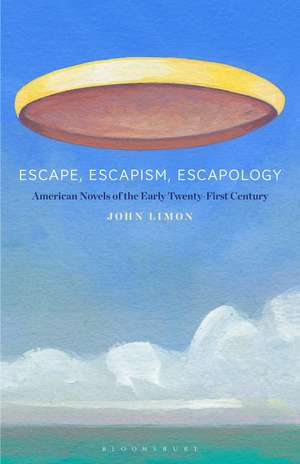Escape, Escapism, Escapology: American Novels of the Early Twenty-First Century
Autor Professor John Limonen Limba Engleză Paperback – 28 sep 2022
| Toate formatele și edițiile | Preț | Express |
|---|---|---|
| Paperback (1) | 155.40 lei 3-5 săpt. | |
| Bloomsbury Publishing – 28 sep 2022 | 155.40 lei 3-5 săpt. | |
| Hardback (1) | 436.15 lei 6-8 săpt. | |
| Bloomsbury Publishing – 28 sep 2022 | 436.15 lei 6-8 săpt. |
Preț: 155.40 lei
Preț vechi: 167.58 lei
-7% Nou
Puncte Express: 233
Preț estimativ în valută:
29.74€ • 30.87$ • 24.80£
29.74€ • 30.87$ • 24.80£
Carte disponibilă
Livrare economică 01-15 martie
Preluare comenzi: 021 569.72.76
Specificații
ISBN-13: 9781501391101
ISBN-10: 1501391100
Pagini: 248
Dimensiuni: 140 x 216 x 21 mm
Greutate: 0.45 kg
Editura: Bloomsbury Publishing
Colecția Bloomsbury Academic
Locul publicării:New York, United States
ISBN-10: 1501391100
Pagini: 248
Dimensiuni: 140 x 216 x 21 mm
Greutate: 0.45 kg
Editura: Bloomsbury Publishing
Colecția Bloomsbury Academic
Locul publicării:New York, United States
Caracteristici
Explores the writings of, among others, Michael Chabon, Junot Díaz, Dave Eggers, Jonathan Safran Foer, Emma Donoghue, Lauren Groff, Colson Whitehead, Jesmyn Ward, George Saunders, David Grossman, Arundhati Roy, Octavia E. Butler, Toni Morrision, and Wililam H. Gass
Notă biografică
John Limon is John Hawley Roberts Professor of English at Williams College, USA. He is the author of The Place of Fiction in the Time of Science (1990), Writing After War (1994), Stand-Up Comedy in Theory (2000), and Death's Following (2012).
Cuprins
IntroductionPart I: Escape, Escapism, Escapology1. Notes from Neverland 2. I Flit, I Float, I Fleetly Flee, I Fly [on The Sound of Music]Part II: Family Likenesses3. The Escapist [on Michael Chabon]4. Mellon [on Junot Diaz]5. Bath and Bathos [on Dave Eggers and Jonathan Safran Foer]6. The Beauty! The Horror! [on Emma Donoghue]7. Et in Nobis Arcadia [on Lauren Groff]8. The Ethics of Immortality [on Colson Whitehead] 9. The Songs of Murdered Souls [On Jesmyn Ward and George Saunders] Part III: Foreign Correspondents10. Choice and the Chosen [on David Grossman]11. Categorical Denial [on Arundhati Roy] Part IV: Prequel12. The Tunnel Out [on William H. Gass] AcknowledgmentsReferencesIndex
Recenzii
If you haven't yet encountered John Limon's work, you have some exhilarating surprises ahead: it's witty, keenly idiosyncratic, beautifully adroit at drawing unexpected connections, and spectacularly attuned to the evocative possibilities of both paradox and pathos. Escape, Escapism, Escapology: American Novels of the Early Twenty-First Century is a savvy examination of crucial obsessions in some of our most ambitious and canonical contemporary fictions, helping us through the problem of conceiving not only what we're escaping from but also what we're escaping to. The result is an argument that will compel both the ornithologists and the birds: one that our Michael Chabons will find as illuminating as our Stanley Cavells.
Limon's bleakly funny and effortlessly learned study examines novels for which this, the world now before us, is 'as good as it gets.' That equivocal and confounding prospect, it turns out, haunts contemporary fiction in previously unimaginable ways. This is literary criticism at its very best.
John Limon's Escape, Escapism, Escapology will stand as a landmark study of the early twenty-first century Anglophone novel. Its elaboration of escapism offers a brilliantly original and suggestive framework for a widescale reconsideration of the force and interest of contemporary fiction. I can think of very few recent works of criticism that can match its interpretive verve and its contagious curiosity. It is thrilling to read such an intellectually forceful engagement with aesthetic culture of the present moment.
Limon's bleakly funny and effortlessly learned study examines novels for which this, the world now before us, is 'as good as it gets.' That equivocal and confounding prospect, it turns out, haunts contemporary fiction in previously unimaginable ways. This is literary criticism at its very best.
John Limon's Escape, Escapism, Escapology will stand as a landmark study of the early twenty-first century Anglophone novel. Its elaboration of escapism offers a brilliantly original and suggestive framework for a widescale reconsideration of the force and interest of contemporary fiction. I can think of very few recent works of criticism that can match its interpretive verve and its contagious curiosity. It is thrilling to read such an intellectually forceful engagement with aesthetic culture of the present moment.
